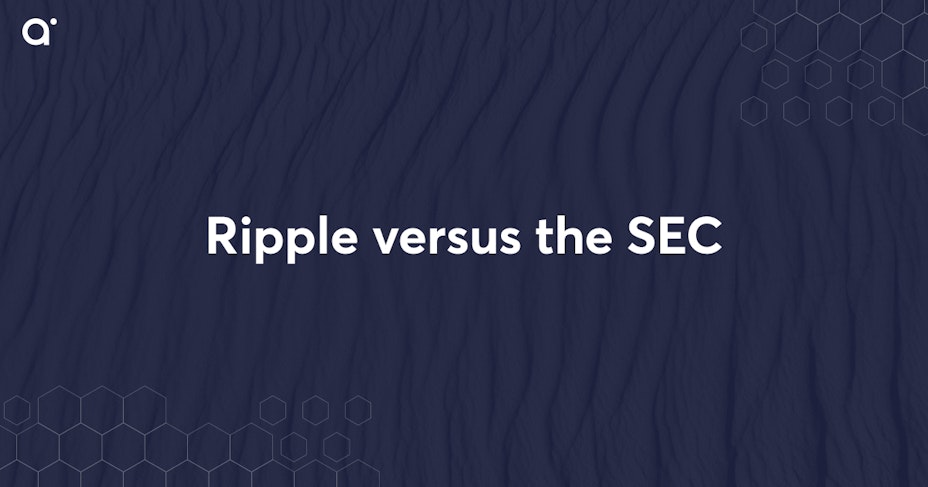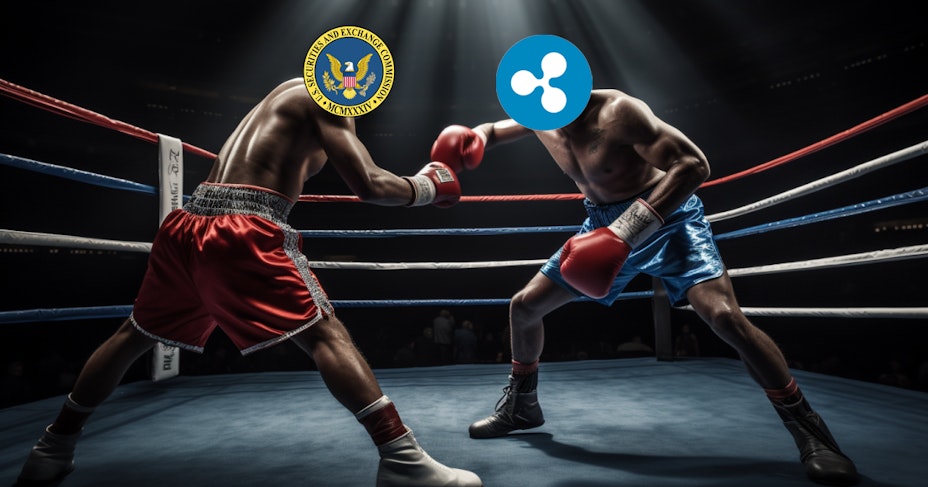Ripple versus the SEC
- 7 minute read

Almost everyone has heard about the "special consideration" the SEC (US Securities and Exchange Commission) is giving to Ripple’s cryptocurrency XRP. This goes back a long way. Involuntarily, you frown a bit. What could be the reason the SEC is so focused on Ripple, while other cryptocurrencies hardly get any attention from them?

Brief summary
✔️ Ripple Labs is the company behind the cryptocurrency XRP, known for its fast and cheap transactions around the world.
✔️ The SEC (US Securities and Exchange Commission) has filed a lawsuit against Ripple Labs, alleging that Ripple offered securities to the public without registering them with the SEC.
✔️ The SEC argues that Ripple is centralized in nature because of its own nodes, unlike decentralized cryptocurrencies, and therefore should be considered a security.
✔️ Ripple works with major banks and has the trust of these institutions, while other cryptocurrencies, such as Bitcoin, actually try to enable payments without third-party involvement.
✔️ The outcome of the lawsuit could have major implications for the regulation and oversight of cryptocurrencies in the U.S. and possibly beyond. It determines whether Ripple Labs and XRP are considered securities and may have implications for other cryptocurrency networks.
Table of Contents
- What is Ripple anyway?
- Historic clashes between the SEC and Ripple Labs
- Why the SEC is so emphatic about this
What is Ripple anyway?
Ripple Labs is the company behind the cryptocurrency XRP.
XRP allows you to transfer funds to anywhere in the world in a very short time at very low cost. The network can process many transactions within a short time and is known for its tower low transaction fees. Many times I have exchanged coins on an exchange for XRP so that when I go to ship them to another address the transaction fees were very low.
What Ripple and XRP also do is eliminate the middle layer. Suppose you want to transfer 50 euros to someone in the US. Before those 50 euros reach the other side, you got to have a bank account in a bank in your country, the other person has to have one too, and then it has to be exchanged into dollars, with all kinds of bank fees added, and it also takes quite a bit of time.
With XRP it is instantly in his account at a very low cost. They are also energy efficient because you cannot mine XRP.
Well, that does sound threatening to world peace! Ripple is already working with major banks, such as Santander, Bank of America and other large corporations. So they do have confidence in Ripple Labs and XRP. In this, they are different from Bitcoin for example, which instead wants to be an alternative for payments without the involvement of third parties (especially banks).
So, what is the SEC really trying to accomplish with their lawsuits against Ripple Labs, the firm behind XRP?
First, let’s bring out a little history of this clash of the titans.
Historic clashes between the SEC and Ripple Labs

In December 2020, the SEC (US Securities and Exchange Commission), comparable to the Financial Markets Authority (AFM) in Holland, started a lawsuit against Ripple Labs, the company behind XRP. It could not have come at a worse time for XRP, as that was the start of the bull market, in which all coins exploded and XRP topped at "only" a mere 3 euros.
The reasoning of the SEC was that Ripple Labs offered securities (securities, stocks, bonds, options, et cetera) to the public without registering them with the SEC.
Whereas other cryptocurrencies operate with decentralized networks, Ripple picks his own nodes. This gives it a centralized nature and therefore it is a security, according to the SEC.
In many other countries, XRP is not considered a security or stock at all, but simply a cryptocurrency. The only one who thinks otherwise is the SEC. As such, it is a bit like a witch hunt. Only the loot may be bigger than just Ripple Labs and XRP.
After all, if the SEC wins the lawsuit against Ripple, it might well start to harass other cryptocurrency networks, just because they can. Before you know it, the SEC will be dictating which coins you can still buy and under what conditions. That would be (at least in the U.S.) the end of cryptocurrencies’ Wild West and the beginning of regulation and oversight.
The SEC has a point somewhere, as they argued that Ripple Labs keeps selling coins to the public and there is talk of an endless ICO, with Ripple Labs hotshots lining their pockets with more than a billion dollars in total. That’s true, but that’s not what this case is about. Because they would win that case, if it were a case.
In America and in other countries, if you ask the public for money to fund your business, you are issuing shares (securities) and you must report it to the SEC. Well, a lot of cryptocurrency networks do this, so the implications could be huge. You can't run a business without funds, because your developers also need to be paid. So, you have to ask the public for money. However, these are not shares you sell, but cryptocurrency. A buyer is not entitled to dividends or anything at all but is in a market with his purchased cryptocurrency based on supply and demand.
Anyone who buys XRP is obviously not a shareholder of Ripple Labs! That seems like utter nonsense to me. You could use the broad axe and call the nodes shareholders of Ripple Labs, because they are paid for their services in XRP, which seems to be a commercial agreement. After all, they are appointed by Ripple Labs itself, albeit for reliability and speed.
What a security is (or investment contract) has been well established since the 1946 Howey case. A security is a monetary investment in a company, where profit is expected by using the efforts of others. If this is the case the company marketing these securities will have to comply with the 1933 Securities Act and the 1934 Securities Exchange Act.
With the SEC being so harsh, many new companies are choosing to exclude Americans in their ICO. That will teach them!
If you want to apply these rules to XRP you will have to squirm like a snake to eventually straighten this out to the point where it passes the Howey test. You are certainly investing money, but whether you make a profit from the efforts of others remains to be seen. Cryptocurrency is volatile and making losses is the order of the day. Therefore, this seems impossible to prove and Ripple Labs will definitely win this case in my opinion.
This lawsuit is actually a contiguous case by the SEC against Ripple Labs, which is still ongoing. So, it is just one lawsuit, which has multiple components.
One of the newer components are the emails from former SEC director Hinman, in which he emphatically reflects that Ethereum is not a security. Rumors say that this is about bribery by the Ethereum Foundation. The latter seems strong to me, but the evidence will ( after they are adjusted ) are made public. Well, if you are going to modify them first there will be little of importance left.
An important lawyer in this matter is John Deaton. He has already once saved the crypto company LBRY from a ruling in favor of the SEC in a similar case. So, his opinion on this case may carry some weight:
John sees 4 possible scenarios as this lengthy lawsuit will end:
- Ripple Labs wins on all counts against the SEC and just continues what it was doing.
- Secondary sales to the public are legal, but sales to specific investors were securities.
- Both motions are rejected, and no one wins.
- The SEC wins and not just Ripple Labs has a problem, but all cryptocurrencies that offer their crypto to the public in an ICO or the likes.
According to him, a win for Ripple Labs is the most likely (since a Howey test clearly indicates this).
Why the SEC is so emphatic about this
To this, of course, I can only guess since I cannot read minds and there is no evidence of their ideas in official documents. Well, I’ll just go digging in my common sense, as far as I have any!
Ripple Labs moves primarily in the banking world. These are vested interests with deep pockets and long arms. The banking world naturally wants to preserve its revenue model and if a company comes along that can threaten this (Ripple Labs) then the right people need to be put forward to thwart them.
So, they called the SEC asking them to jump on Ripple Labs and make their lives as miserable as possible. The call probably ended with the words, "I owe you a favor." You know how it goes in high places. Business is business.

Another reason I can think of is that the SEC wants to get his foot in the door regarding cryptocurrency. Of course, if the camel once gets his nose in the tent his body will soon follow. If they win this case, they will start making a list of the next victims on their wish list to "regulate." Pure abuse of power, extension of power or use of power, whoever knows another name for it may fill in this sentence.
Depending on the judges’ views (and also somewhat on the laws in that country!), it seems to me that Ripple Labs has a good chance of winning the whole case. The Howey test is easy to interpret. They seem to be having quite a hard time with it over there, though, as this thing has been going on for years now.
My judgment is that XRP is not a security, because cryptocurrency cannot be sold saying: you are going to make a profit with this through the efforts of others! If there were such a coin, I would buy it right away! Who wouldn’t?


